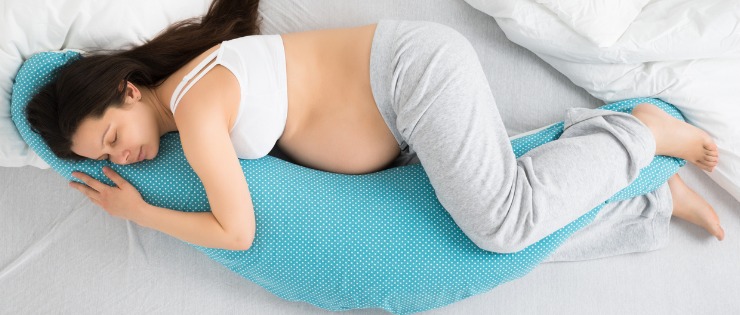
Many mums-to-be wonder how they will cope with the sleepless nights when their little bundle of joy arrives. What many first-time mums find out is that difficulty sleeping can start long before the due date.
With their body undergoing significant changes, worries and the need to change their sleeping position, getting some nightly slumber can be difficult in even the deepest sleeper.
The ideal sleeping position for the second and third trimesters is side sleeping on your left. Once you have mastered the new sleep position, there are a few other tips you can use for getting some much needed shut eye before your bub arrives and really messes with far more than your sleeping position!
Sleeping Positions While Pregnant
During the first trimester, you shouldn’t have to worry about sleeping positions. Your stomach hasn’t expanded enough to interfere with the way you sleep, but it’s an excellent time to start trying to fall asleep in positions you aren’t used to. It might not be easy to start later in pregnancy when everything to do with sleep becomes more difficult.
Sleeping on your Left Hand Side
The left-hand side of your body is the preferred sleeping position while pregnant. The uterus isn’t putting pressure on your liver like it does when you are lying on your right. This side also doesn’t restrict blood flow which means the blood can deliver oxygen and nutrients to the placenta and the baby. The improved circulation is also good for mum because your body doesn’t have to work as hard on blood flow. Best of all, proper blood circulation reduces swelling which might help you avoid the dreaded cankles.
Stomach Sleeping Isn’t Going to Work
By your second trimester, some sleeping positions aren’t as comfortable as others. Even if you’re used to spending your night sleeping on your stomach, you’ll soon get out of that habit. Your increasing waistline will make it uncomfortable, so your body will naturally find a new sleeping position.
But what if you’re a back or side sleeper? Those sleeping positions may also need some modifications. Not only can a different way of sleeping deliver some much-needed shut-eye, it can also be healthier for mum and bub.
Avoid Sleeping on Your Back
Lying on your back for long periods of time means your heavy uterus is putting pressure on the vein that returns blood to your heart. The lack of blood circulation can make you feel nauseous and dizzy and could also restrict the amount of blood reaching the placenta.
Sleeping on the right-hand side of the body will put pressure on the same vein. While the right hand side isn’t as bad as sleeping on your back, the extra weight of the developing baby, can cause a reduction in the circulating blood supply.
What if You Don’t Stay Sleeping in your Preferred Position?
You might do all the right things to set yourself up for the night in the right position but then you wake up in a completely different and less than ideal posture. Don’t worry. If your body is struggling with blood flow or a squashed organ, it can move into a new position to improve the situation. If your baby isn’t getting the oxygen it needs, it is thought that the baby can give you a good kick to encourage you to change position.
The Power of Pregnancy Pillows
Many women believe their pregnancy pillow helped them get some sleep during their pregnancy when nothing else worked. Pregnancy pillows are designed to support parts of your body at night and help you stay in roughly the same place.

Lying on your side for hours can cause back pain because of the weight of the pregnant bump. A heavier uterus puts pressure on the ligaments that hold it in place. The stretched ligaments can then cause lower back pain. With a pillow supporting the weight of the uterus, the ligaments are not working as hard.
Pregnancy pillows come in all shapes, sizes and materials. Pregnancy pillows can be made from memory form or be stuffed with fibre filling, Styrofoam balls or microbeads to modify the weight and density.
Choose a pillow that you think will provide comfort to the area of your body that aches the most at the end of the day. You might need to try more than one to find the right fit for you.
Full-Length Pillows
Similar to your usual pillow, this one is just three times longer. Use the centre of the pillow to support your stomach and relieve any tension in your legs and ankles by placing the pillow between your legs and arms.
Pillows Shaped Like a C, J or U
It might sound like you are taking the alphabet to bed, but these pillows are designed to stop you from rolling on to your back. Shaped as the letters suggest, the pillow runs along your back and between your knees. They support your lower back and pelvis throughout the night. For some pregnant women, they offer peace of mind that they won’t roll onto their back.
Wedge Pillows
Made from memory foam, the wedge pillow can be used in a variety of ways. It can be used to support the growing stomach while side sleeping. For pregnant women suffering from heartburn or acid reflux, they may feel better to raise their head by placing the wedge under their usual pillow.
Full Body Pregnancy Pillows
If you feel like you want to support several parts of your body rather than one or two, you may need the full body pillow to support your thigh/leg, bump, head, back and chest. Just beware these pillows are big, and there may not be enough room for your partner in the bed at the same time!
What Else Can You Do to Get Some Shut-Eye During Pregnancy?
No one wants to start motherhood already exhausted and sleep deprived. When you know you have months of night feeds and settling in ahead of you, you want to get as much quality sleep as you can in the last trimester of pregnancy. But try as you might, sleep can be elusive. Between getting up to go to the toilet several times during the night, discomfort and restlessness, there are a few things you can try to help you get to sleep faster and get a better night’s sleep.
Cut out Caffeine
Even a small quantity of coffee during the day can make falling asleep more difficult. Limit any tea or coffee to the morning, so your body has several hours to process it before you want to settle down to sleep.
Try Relaxation Techniques
Meditation and yoga can help you relax, unwind and prepare for sleep. Your mind will probably be buzzing so much with work and preparing for becoming a parent that it’s hard to slow down enough to sleep. A massage can help with falling asleep if you are suffering from pregnancy aches and pains.

These relaxation techniques may work on you but your bub might have other ideas. During the day the baby is often rocked to sleep due to your movements then when you are ready to settle down, your baby is awake and active.
Food Intake
Your stomach is just one of the organs being squashed to make way for the growing baby. Many pregnant women complain of heartburn during pregnancy. Eating smaller meals more frequently can help with heartburn and indigestion which can help with sleep.
Have a Warm Drink Before Bed
Drinking warm milk before bed to help you fall asleep is equal parts science and old wives’ tale. Milk contains an amino acid tryptophan which is a precursor to the feel-good hormone serotonin. The hormone can then be converted into melatonin which is known as the darkness hormone. However, the amount of tryptophan in a cup of milk is low and probably not going to make any difference. The brain is powerful at making associations, and if having a cup of hot milk helps prepare you for sleep then it does its job.
For women who aren’t milk drinkers, you could get the same result sipping a fruit or herbal tea. Make sure your tea doesn’t contain caffeine and is safe to drink during pregnancy.
Take a Shower or Bath
Many people find that taking a hot shower or bath right before bed helps them fall asleep faster. Remember not to make the water too hot or stay in a bath or spa too long in case your body overheats.
Try Not to Worry about Sleep
Remember, don’t make your sleeping position something you should worry about. Stressing about it might just make things worse!
Your body naturally knows when it’s in a less than ideal position for sleep. You will instinctively roll over to another position, and if you don’t, there’s always baby ready to give you a swift kick to encourage you to roll over.
If you have any questions relating to sleep, ask your doctor or midwife at your next appointment. You want to do what you can to get as much sleep as possible while you can. But if rest doesn’t come quickly to you during pregnancy think of it as good training for surviving sleepless nights with a newborn baby.